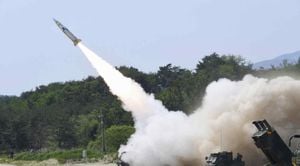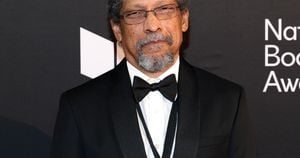North Korea's military support for Russia during the Russo-Ukrainian War marks a significant turn in international relations, with both nations finding themselves increasingly intertwined amid the turmoil of the conflict. The cooperation stretches beyond standard military alliances, positioning North Korea as a key player with potentially alarming consequences for regional stability.
The Russo-Ukrainian War, which has escalated significantly since February 2022, is now witnessing the largest military collaboration between North Korea and Russia since the Cold War. International Military Intelligence has confirmed North Korea's provision of arms, including thousands of missiles and other munitions, to bolster Russian forces. This support is formalized under the Comprehensive Strategic Partnership Treaty, signed by Russian President Vladimir Putin and North Korean Leader Kim Jong Un in June 2023.
This treaty obliges both nations to respond to military threats against each other. Experts are debating the exact parameters of this obligation, questioning whether North Korea is required to defend Russia only if Russia faces direct aggression, as opposed to if it instigates conflict. Nevertheless, North Korea has reportedly dispatched about 10,000 soldiers to aid Russian troops, marking its most significant military engagement since the Korean War.
The deal appears to be mutually beneficial; North Korea receives not only financial assistance—over $263 million annually and approximately 700,000 metric tonnes of rice—but also advanced military technology from Russia. There are indications this technology may assist North Korea’s pursuit of enhanced nuclear and missile capabilities.
U.S. intelligence confirms the presence of North Korean soldiers near Ukraine’s borders, indicating expansive military involvement. Ukraine's President Volodymyr Zelensky has been vocal about this development, asserting during his address to the European Parliament, "Putin has brought 11,000 North Korean troops to Ukraine's borders, and this contingent may grow to 100,000." This alarming prospect highlights both nations' intent to fortify their positions against perceived Western adversaries.
While South Korea watches closely, anxious about North Korea's bolstered military capacity, there’s been condemnation of this military alliance from both South Korean and EU officials. Many fear the ramifications of such cooperation could extend beyond the battlegrounds of Ukraine, potentially threatening the delicate balance of peace on the Korean Peninsula.
Further complicity arises from North Korea's growing arsenal, which is being modernized through its alliance with Russia. Various South Korean and international leaders are now reconsidering their military alliances and support frameworks. Until now, Seoul has refrained from supplying lethal aid to Ukraine, focusing instead on humanitarian support. Should North Korean troops continue to engage actively alongside Russian forces, there could be immense pressure on South Korea to shift its stance.
International responses pivot around the strategic dynamics introduced by North Korea's engagement. Since the war’s escalation, sanctions imposed on Russia seem ineffective as it turns to partners like Iran, China, and now, North Korea for support. Iran has supplied drones, and China has facilitated economic lifelines, creating a network of support aiding Russian military ambitions, evident from recent reports of devastation wrought upon Ukrainian infrastructure.
The outlook seems grim as international observers contend North Korea’s involvement could sustain and potentially intensify the conflict. Critical debates are occurring within the global community on how best to respond. Ukraine's leadership, backed by significant military and humanitarian aid from NATO and other partners, is on high alert. Zelensky has insisted on prompt international reformation of policies to counter North Korea’s military participation.
Compounding the crisis, the repercussions of North Korea’s military aid and Russia’s reliance on foreign support could draw other nations, particularly the U.S. and its allies, closer. There’s speculation surrounding the possibility of increased military aid to Ukraine and countermeasures being prepared by South Korea, which could change the dynamics on both the European and Asian fronts.
Putin's efforts to bolster military support culminated dramatically, with reports detailing bizarre exchanges between the two nations; just recently, Putin was said to have gifted zoo animals—a lion and two bears—to North Korea as thanks for the manpower and military support. Such gestures symbolize not just camaraderie but the bizarre realities of global politics during emergency times.
Despite mixed perceptions surrounding these developments, there is undeniable concern over the escalation of this conflict—a war now not just representative of Russia and Ukraine but of shifting allegiances and the potential for broader geopolitical realignments. Onlookers worry about the possible occurrence of proxy capabilities, turning citizens from both nations to pawns on frameworks of military strategy.
The looming question remains: how will the West counter this apparent escalation, and what strategies lie ahead to navigate the precarious balance of power, especially as international entities like the United Nations struggle to mediate effectively under existing hierarchies? With North Korea's newfound commitment to the Russian side of the battle, the potential for increased hostilities globally has never seemed closer.
Finally, the message is stark: without concerted efforts to de-escalate and manage the war's expansion through unified international response, this conflict could epitomize the potential triggers for global unrest, putting countless lives at risk. Motivated leaders must recognize the stakes at hand and invest diligently to restore political order rather than abandon free states to the uncertainties of military entanglement.



